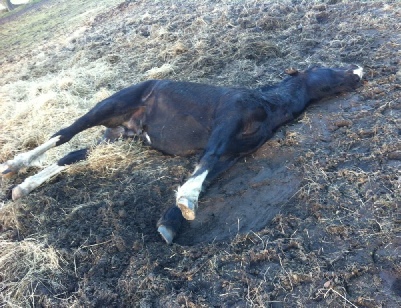
0345 095 9995 Out of hours call 07966 367746
© Dukes Vet Practice 2013, 2014, 2015

Dukes Equine Vets Ltd
Tetanus
Horses are much more susceptible to tetanus than other species. Although the disease is rare because many horses are vaccinated if a horse becomes infected over half of all cases will die even with expensive and intensive treatment.
Tetanus spores are everywhere and in damp soils not exposed to oxygen they can survive for an indefinite period. Some farms have multiple cases of tetanus but even if there’s never been a case on your land you cannot be certain that undisturbed spores are not lurking somewhere! Disease occurs typically when the spores enter a wound and then start to multiply. The wound can be very small and difficult to find but the tetanus bacteria produces an extremely powerful neurotoxin which causes rigid spasms in muscles. The horse becomes stiff, reluctant to move, becomes hyperaesthetic (overly responive to stimuli such as noise or movement) then the muscles become rigid and you may see classical lockjaw and what's described as a rocking horse stance.
Disease occurs typically when the spores enter a wound and then start to multiply. The wound can be very small and difficult to find but the tetanus bacteria produces an extremely powerful neurotoxin which causes rigid spasms in muscles. The horse becomes stiff, reluctant to move, becomes hyperaesthetic (overly responive to stimuli such as noise or movement) then the muscles become rigid and you may see classical lockjaw and what's described as a rocking horse stance.
Sadly this is a recent case (February 2015) which was too far gone at presentation to treat. Note the rigid limbs, arched spine and clamped jaw with retracted lips which are all signs associated with an advanced stage of the disease. However the disease advances rapidly and a horse which may just appear a bit stiff and out of sorts could progress to this within 24 hours!!
Luckily there is a relatively cheap and very effective vaccine available. The initial course is two doses four weeks apart with a booster a year later then every second year. This can be combined with flu vaccination. If you have a large number of unvaccinated horses we would look at a discounted price to ensure you can protect all the horses. Because of problems with interference from maternal immunity foals cannot start being vaccinated until they are 6 months old. However they can be given tetanus antitoxin at birth to boost the immunity. Although useful, the antitoxin only stays in the system for a couple of weeks, so if an older foal is injured a top-up dose of antitoxin should be considered.




